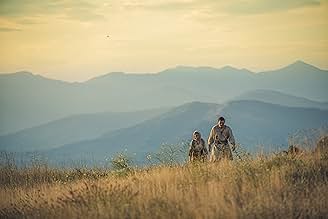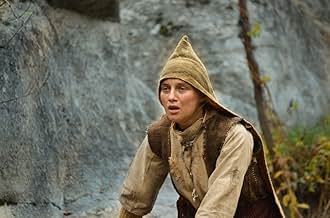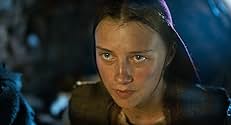Willow
- 2019
- 1h 41min
VALUTAZIONE IMDb
7,2/10
1075
LA TUA VALUTAZIONE
Aggiungi una trama nella tua linguaThree women - one medieval, two contemporary - struggle to become mothers. They have not set out to change the world or society, but their struggles with tradition, loyalty, adoption and con... Leggi tuttoThree women - one medieval, two contemporary - struggle to become mothers. They have not set out to change the world or society, but their struggles with tradition, loyalty, adoption and control over their bodies make them unlikely heroines.Three women - one medieval, two contemporary - struggle to become mothers. They have not set out to change the world or society, but their struggles with tradition, loyalty, adoption and control over their bodies make them unlikely heroines.
- Premi
- 13 vittorie e 5 candidature totali
Trama
Lo sapevi?
- QuizOfficial submission of North Macedonia for the 'Best International Feature Film' category of the 93rd Academy Awards in 2021.
Recensione in evidenza
It seems to me that there are relatively few pictures in the world that broach the same subject matter that this does. Many are those titles that tell stories of child-rearing, family life, and relationships between parents and children; many are those titles that tell stories of women, or men, who live their lives without children, or without any interest in raising children. Far fewer are those flicks that tend instead towards exploration of the deep-seated desire and pursuit of motherhood, and of parenthood, and the turbulence that may arise from trying to build a family. I must give credit where it is due, for filmmaker Milcho Manchevski was marvelously shrewd in crafting his screenplay, and in bringing it to fruition. 'Willow' is somber and heartbreaking, unmistakably, yet across its three discrete tales - linked by themes, small references, and in some measure by narrative threads - there is also tremendous warmth, a thriving human element, and even tinges of humor. Just as much to the point, there are more than enough differences between each segment to keep the proceedings fresh, and to keep us engaged; each bears a slightly different tenor. I forget how I first came across this, but I've very much been looking forward to watching and assumed I'd enjoy it, and I'm incredibly pleased with how good it is.
It's not that any one facet wholly leaps out at us, but in every capacity the feature is stupendously smart, crafted with utmost skill, intelligence, and care. Manchevski's direction is impeccable, shaping every scene with sharp mindfulness that brings to bear the emotional depth and potency of each element therein. Tamás Dobos crisp, vivid cinematography, and Kiril Dzajkovski's score, which while dynamic and sparing always manages to come to the fore and shift in just the right manner to both complement and reinforce the tension at any moment. All these same descriptors quite apply to the cast, for from one to the next every actor is truly just as terrific in finding the core of their characters and embodying them. Sara Klimoska, Natalija Teodosieva, and Kamka Tocinovski stand out most both for how their roles are written, their prominence in their segments, and for the overall thrust, yet each in turn also give fantastic, nuanced, yet powerful performances that speak directly to the heart of the concept. To scarcely any lesser degree, Nikola Risteski and even more so Nenad Nacev make big impressions in their supporting parts, not to mention Ratka Radmanovic and young Petar Caranovic, even with their more limited or strictly defined time on-screen. Further rounded out with flawless sound design, surprisingly keen and even impactful editing, and excellent production design, art direction, costume design, hair, and makeup, 'Willow' is gratifyingly well made in every regard.
And still I think it may be the script that provides the primary strength in these 100-odd minutes. In ways big and small Manchevski penned something bright and thoughtful, from the overarching ideas on hand, to those fashions in which each subsequent tale calls back to the one before it, to the very fluid and natural approach Manchevski takes to informing us of how time has advanced in each story. Modern cinema often downplays maternal yearnings, desires, and instincts, leaning toward the very reasonable ethos informed by feminism that a woman is to be valued as and for more than just her reproductive function, yet the ability to bear a child can be just as much a part of women's experiences as her personal strength, individuality, intellect, and otherwise capabilities. This is the tent pole of Manchevski's film: centering women, and their struggles in one way or another of motherhood or becoming mothers, while also definitively writing Donka, Rodna, and Katerina as women asserting (or trying to assert) control over their bodies, their lives, and their personal destinies. With this in mind, the character writing is gratifyingly firm, particularly in the second and third plot lines; there is wit in the dialogue, too. Hand in hand with the narratives and thematic considerations that are wonderfully absorbing, compelling, and satisfying, the scene writing is uniformly vibrant and flavorful while also remaining focused on the underlying intent.
I could hardly be any happier with this feature. It sadly gone rather unremarked in the world at large, a grave error in my estimation; the fact that one is likely to come across it only by chance is a significant disservice to Manchevski, and all others involved, for in my mind they deserve hearty congratulations and recognition. 'Willow' is impactful, engrossing, and indeed rewarding to an extent I did not anticipate; it's one matter to watch a little-known international movie and appreciate them, but for such a work to stick with us, and resonate with us, is less common. I can only give this my very highest recommendation; 'Willow' deserves far wider viewership, and is well worth seeking out!
It's not that any one facet wholly leaps out at us, but in every capacity the feature is stupendously smart, crafted with utmost skill, intelligence, and care. Manchevski's direction is impeccable, shaping every scene with sharp mindfulness that brings to bear the emotional depth and potency of each element therein. Tamás Dobos crisp, vivid cinematography, and Kiril Dzajkovski's score, which while dynamic and sparing always manages to come to the fore and shift in just the right manner to both complement and reinforce the tension at any moment. All these same descriptors quite apply to the cast, for from one to the next every actor is truly just as terrific in finding the core of their characters and embodying them. Sara Klimoska, Natalija Teodosieva, and Kamka Tocinovski stand out most both for how their roles are written, their prominence in their segments, and for the overall thrust, yet each in turn also give fantastic, nuanced, yet powerful performances that speak directly to the heart of the concept. To scarcely any lesser degree, Nikola Risteski and even more so Nenad Nacev make big impressions in their supporting parts, not to mention Ratka Radmanovic and young Petar Caranovic, even with their more limited or strictly defined time on-screen. Further rounded out with flawless sound design, surprisingly keen and even impactful editing, and excellent production design, art direction, costume design, hair, and makeup, 'Willow' is gratifyingly well made in every regard.
And still I think it may be the script that provides the primary strength in these 100-odd minutes. In ways big and small Manchevski penned something bright and thoughtful, from the overarching ideas on hand, to those fashions in which each subsequent tale calls back to the one before it, to the very fluid and natural approach Manchevski takes to informing us of how time has advanced in each story. Modern cinema often downplays maternal yearnings, desires, and instincts, leaning toward the very reasonable ethos informed by feminism that a woman is to be valued as and for more than just her reproductive function, yet the ability to bear a child can be just as much a part of women's experiences as her personal strength, individuality, intellect, and otherwise capabilities. This is the tent pole of Manchevski's film: centering women, and their struggles in one way or another of motherhood or becoming mothers, while also definitively writing Donka, Rodna, and Katerina as women asserting (or trying to assert) control over their bodies, their lives, and their personal destinies. With this in mind, the character writing is gratifyingly firm, particularly in the second and third plot lines; there is wit in the dialogue, too. Hand in hand with the narratives and thematic considerations that are wonderfully absorbing, compelling, and satisfying, the scene writing is uniformly vibrant and flavorful while also remaining focused on the underlying intent.
I could hardly be any happier with this feature. It sadly gone rather unremarked in the world at large, a grave error in my estimation; the fact that one is likely to come across it only by chance is a significant disservice to Manchevski, and all others involved, for in my mind they deserve hearty congratulations and recognition. 'Willow' is impactful, engrossing, and indeed rewarding to an extent I did not anticipate; it's one matter to watch a little-known international movie and appreciate them, but for such a work to stick with us, and resonate with us, is less common. I can only give this my very highest recommendation; 'Willow' deserves far wider viewership, and is well worth seeking out!
- I_Ailurophile
- 3 mag 2024
- Permalink
I più visti
Accedi per valutare e creare un elenco di titoli salvati per ottenere consigli personalizzati
- How long is Willow?Powered by Alexa
Dettagli
- Data di uscita
- Paesi di origine
- Siti ufficiali
- Lingua
- Celebre anche come
- Söğüt
- Luoghi delle riprese
- North Macedonia(Skopje, Mariovo)
- Aziende produttrici
- Vedi altri crediti dell’azienda su IMDbPro
- Tempo di esecuzione1 ora 41 minuti
- Colore
Contribuisci a questa pagina
Suggerisci una modifica o aggiungi i contenuti mancanti


























